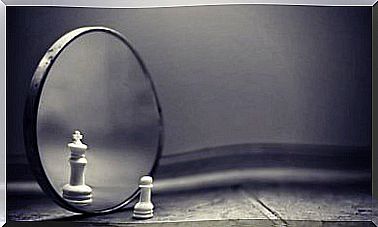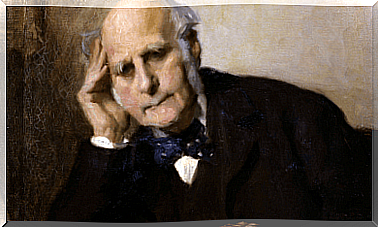Do You Tell Yourself The Whole Truth?

Since we were born, we are making decisions. Incredibly, we decided early on: we decide whether we are going to take a toy or another, whether we are going to eat ice cream of one flavor or another… in short: as thinking and feeling adults, we are made of the sum and interaction of each of our decisions.
Since we came into the world, we have also been “telling things”. Sometimes, the importance of what happens is how we tell it, as we are the “narrators” of our own life.
Our very survival causes us to “distort” reality, so that we generate something like mental “bumpers” that make our perception of our surroundings and ourselves “worthy, easy, or bearable”.
the denial of the truth
One of these distortions is called denial, and it is one of the classic defense mechanisms : we do not face conflicts or complex realities directly denying that they exist, that they are important or that they have anything to do with us. We are rejecting aspects of reality that we do not like. The dangerous “mental trick” of negotiation is that we don’t realize what’s behind it.
We live facing emotional conflicts and threats that can arise internally or externally, while we refuse to recognize certain painful aspects of the reality around us. However, others are able to see these aspects.
There are many ways of deriving conduct from denial; in the most severe cases, we have dangerous behaviors or the consumption of substances : most people who suffer from alcoholism will deny that they suffer from this disease, and will always claim that they are in control. A priori, others understand that he is lying and that he is hiding the truth from us, but “he is lying and hiding the truth from himself”, that is why he does not tell others either.
In the example of substance use, we can clearly see this mechanism; but what happens when denial is also put into practice in interpersonal relationships? Just as in dependencies, negotiation prevents us from seeing reality, does not let us be free and inevitably leads us to establish bonds of a dependent nature.
But why do I deny it?
Most of the time, we deny ourselves things about our relationships, especially the couple, for emotions or beliefs that are deeply rooted and rooted within ourselves, such as fear of abandonment and low self-esteem. In addition, in the “passion” process, we can succumb to a powerful model of partner idealization: by denying those behaviors that hurt me, I get involved in a potentially toxic bond while I “tell” the reality of the person in front of me in an idealized way, which will reduce the impact of those harmful conducts that do not benefit me. So I’m building the foundation of an emotional bond as potent as it is dependent.
How do I know if I’m fooling myself?
Our body is surprisingly wise, our nature is magical and that is why we react to external stimuli in a physical way : all emotions are manifested at an organic level, be it pity, anger, joy, sadness, anxiety…
There are phrases or behaviors from our partner that provoke negative reactions in our body: we have to listen to what our body tells us.
We can take the example of pity: most dependent bonds are characterized by emotions such as pity and pity. If in a new relationship we are feeling sorry, we won’t notice the rest of the things that come with this pity, so we deny them. We all know the phrases: “I’m sorry” , “I don’t want to leave him alone, he has no friends, I’m sorry” or “I know she doesn’t treat me well but she’s suffering for other things, it’s a pity, he’s a good person”.
Pity is not love, pity does not lead to passion, it leads to the establishment of dependent bonds, it makes us feel “that they need us” or “we need it” … healthy couples love each other, empower themselves … but they don’t need one of the other. They are together because they want to, not because they need to.
The need arises when we are dependent. Dependence leads to isolation and a lack of personal resources, so far from helping us to solve previous needs that we had unresolved, such as low self-esteem or fear of loneliness, it multiplies them.
If we deposit all the source of satisfaction on the other, we run the serious risk of emotional chaos, as our mood will always depend on our partner’s mood, our decisions will have to be validated or approved by our partner… The more we depend, the more inferior we become we feel and have fewer personal resources of our own, so it will be much more difficult to break these “toxic” ties, not only because of the feeling of pity but because we feel that we are alone and that we cannot “be” without the other. Worst of all, to this whole recipe we are adding a terrible ingredient: guilt.
We can identify that we are deceiving ourselves when:
– A loved one makes us feel pity, and we cling to him to justify his behavior.
– The loved one makes us feel jealous, and to justify our jealousy we blame ourselves.
– The loved one makes us feel inferior; we detect that our clothes, our comments, our abilities do not please her and she is ashamed of our reactions.
– The loved one limits our own time and living space, generating a feeling of burden and/or lack of satisfactory social relationships.
If I’m not mistaken, can I still love?
Obviously the answer is yes. Pity is not the same thing as empathy; jealousy is not the same thing as the feeling of intimate connection we establish with our loved one ; feeling inferior is not the same as having different points of view; and sharing activities with the person we love doesn’t mean they have to take up all our time.
We do not choose an owner, nor a child, nor a father or mother, we do not choose a boss or an employee… we choose a life partner. The more we deceive ourselves, the farther we are from pure and unconditional love. The truth is needed to be happy; by accepting reality, we can also evolve in our relationships, as Carl Jung summarizes: “What you deny, you submit; what you accept transforms you”.









